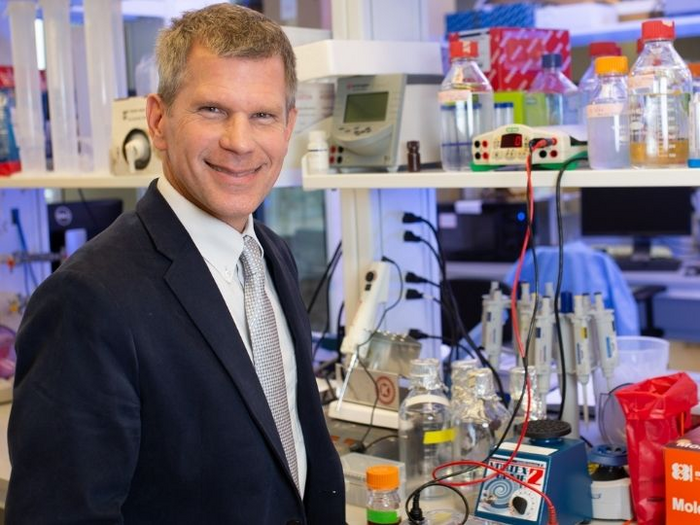The discovery of a small molecule in the research lab of Bradley McConnell, professor of pharmacology at the University of Houston College of Pharmacy, may well be the genesis of new medication which could shorten the course of the SARS-CoV-2 virus. Unlike Pfizer’s antiviral treatment Paxlovid, which is only useful during the first three days of showing symptoms, this possible new medication could reduce the course of the virus upon exposure.

Credit: University of Houston
The discovery of a small molecule in the research lab of Bradley McConnell, professor of pharmacology at the University of Houston College of Pharmacy, may well be the genesis of new medication which could shorten the course of the SARS-CoV-2 virus. Unlike Pfizer’s antiviral treatment Paxlovid, which is only useful during the first three days of showing symptoms, this possible new medication could reduce the course of the virus upon exposure.
“Neutralizing small molecules may provide immediate protection against viral infection, and thus be suitable for people of all ages, and may be particularly suitable for high-risk populations and immunocompromised individuals who typically do not generate sufficient antibodies after vaccination,” said McConnell in Biomedicines. “This exciting new small molecule drug candidate has the potential to be developed into an alternative drug treatment for COVID-19.”
The molecule’s discovery began during the height of the pandemic when students in the McConnell lab were working from home and an idea hatched that perhaps a tiny molecule could impact the virus. The team screened 1,509,984 feature-rich compounds in the UH Research Computing Data Core, home of the Hewlett Packard Enterprise Data Science Institute.
The team searched for a molecule that could interrupt the interaction between the spike protein, located on the outside of the coronavirus, and its human target to enter into human cells, the ACE2 protein.
“Our team is thrilled with the discovery of a small molecule therapeutic that inhibits the interaction between the spike protein of the COVID-19 virus and the ACE2 receptor of the infected individual,” said McConnell. “We are grateful that the University had the high-performance computing power available on campus to advance our work so effectively. This is a discovery that could ultimately impact many lives.”
McConnell’s team includes Arfaxad Reyes-Alcaraz, Hanan Qasim, Elizabeth Merlinsky, Tasneem Islam, and Bryan Medina from the UH College of Pharmacy; Robert J. Schwartz, John W. Craft, Jr. from the UH Department of Biology and Biochemistry; and Glenn Fox, Rogers State University in Oklahoma.
During the experimentation phase, the team selected the top 15 molecules that disrupted the interaction between the spike protein and the ACE2 receptor. Molecular dynamic simulations revealed that some of the compounds from these libraries had favorable interactions with the spike protein’s ACE receptor binding domain interface, leading to a potential neutralization of the SARS-CoV-2 infection, and one particular molecule rose to the top: CD04872SC, which formed the closest association.
“We were able to experimentally observe that CD04872SC also inhibited the infection of the SARS-CoV-2 variants Delta and Omicron,” said Reyes-Alcaraz, the study’s first author.
“To demonstrate the binding between CD04872SC and the spike proteins of each variant, we performed a thermal shift assay which measures changes in the thermal denaturation temperature, serving as an indicator of the stability of a protein under varying conditions such as when bound by a drug, pH, ionic strength, or sequence mutation,” said Craft, associate professor in the Department of Biology and Biochemistry.
It’s a medical discovery whose time has come.
The SARS-CoV-2 virus and variants Delta and Omicron are still a major threat to patients of all ages. The variants demonstrate how easily the virus can accommodate antigenic changes in its spike protein without the loss of fitness.
“The Omicron variant has particularly stressed health care systems around the world. Therefore, identifying effective antiviral agents to combat this infectious disease is urgently needed,” said McConnell.
For the future, McConnell suggests further development of molecule derivatives and preclinical trials.
“This promising drug candidate lead should be developed into a family of derivatives that could be further refined, possibly leading to a more efficacious and cost-effective alternative to expensive neutralizing treatments,” said McConnell.
Journal
Biomedicines
Article Title
A Small Molecule That In Vitro Neutralizes Infection of SARS-CoV-2 and Its Most Infectious Variants, Delta, and Omicron
Article Publication Date
15-Mar-2023




